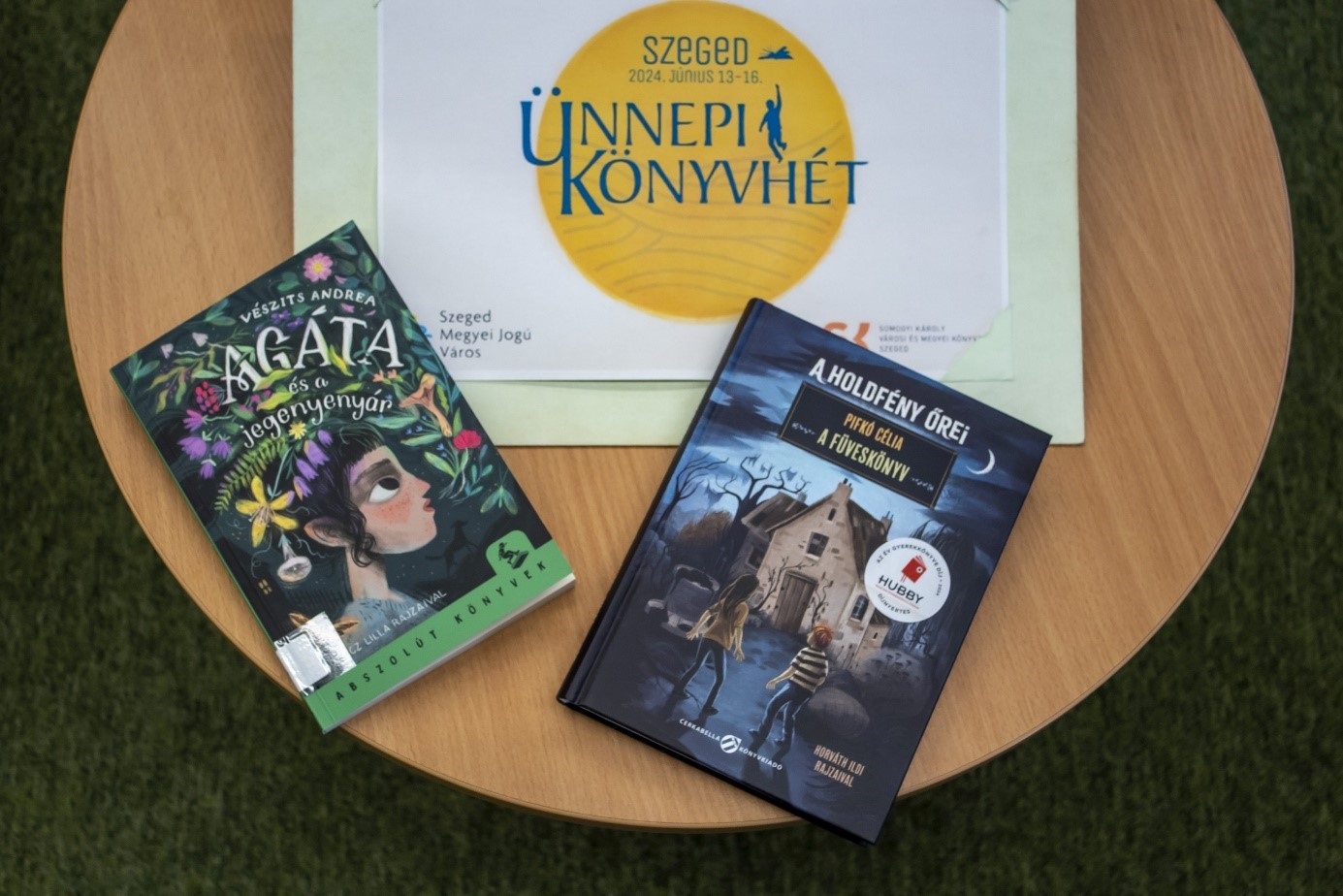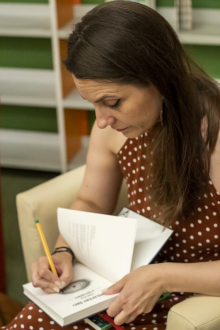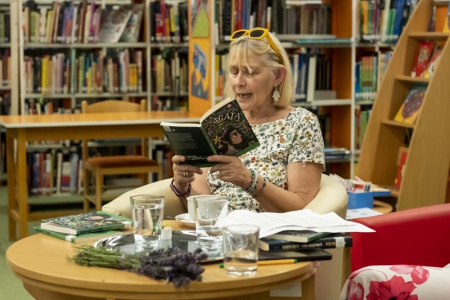Grass and trees, good and evil witches – let’s celebrate books and the youngest readers! Ferenc Mura’s granddaughter Andrea Veszcz and SZTE graduate Celia Pefko also presented themselves at the Writer and Reader Meeting associated with the University of Szeged on the occasion of the 95th Festive Book Week and the 23rd Children’s Book Days.
Agatha and New Year's Eve With title Damn you Andrea He presented his latest book. The heroine of the story is Agatha, who always invents herself in the most extraordinary situations thanks to her boundless imagination. In his adventures, he encounters the evil witch and the tattooed wizard, while also saving trees. Andrea Veszcz is the grandson of Ferenc Mora, also known as an honorary doctor of the University of Szeged. The writer revealed that for her, the fairy tale is a “science preserved since ancient times” that carries collective knowledge.
Orsolya Bensik asked Andrea Veszcz (left) and Celia Pevko (right) about fairy tales and fairy tale heroes. Photo: Adam Kovacs Gerney
Celia PefkoSZTE Graduate Award-Winning Book Guardians of the Moonlight As the first part of the series Herbs book It was published under the title In the story, teenagers discover that the plants on their island have magical powers and hide ancient secrets. According to the author, magic and witchcraft can be an interesting topic in the lives of today's youth. According to him, magic and natural science are not opposites, but rather interact with each other.
Celia Pefko The Book of Herbs (BP, Circabella, 2023) and Damn you Andrea The Somogyi Library Children's Library hosted a meeting between the writer and the reader regarding the book Agáta és a jegenyenyár (Bp., Pagony, 2024). With the famous writers Dr. Orsolya BensikAssistant Professor at the Department of Cultural Heritage and Humanities Information Sciences at SZTE BTK University spoke.
At the book launch, the writers shared who inspired them. Damn you Andrea It tells about its main character, Agatha, and her neighbor, who is not a real witch, although she believes she is. Smoke constantly rises from the chimney and various balls are carried away. Not only magic, but also plants and awareness feature prominently in his work. Agatha's own illness is Tourette's syndrome, so when she is stressed, she has a verbal outburst, in which case she lists the names of plants, which is why the book includes about 300 existing plant names. According to Fessitz, fairy tales have a healing power and carry collective knowledge. Humor and irony are important tools in his stories to help him deal with difficulties.
Celia Pefko His book shows a connection to nature, as a company searching for ancient knowledge tries to uncover the secrets of the island. He said his characters are often inspired by real people, making the story more realistic. Characters are often named after plants so readers can identify more with nature. Brotherly love and tolerance also play an important role in his story, while humor and language games brighten up the story.
The author, Andrea Vesitz, reads details from Agatha's stories.
Participants of the Book Week programme of the Department of Cultural Heritage and Humanities Information Sciences at SZTE BTK returned home with rich cultural experiences. This year’s festive Book Week and Children’s Book Days proved once again that celebrating books and reading is also a real community experience.
SZTEinfo – L. Cs.
Photos: Adam Kovacs Jerney
95. Celebration Book Week 23. We wrote about the Children's Book Days programs:
“They Talked to the Stars” by the Cholnoki Brothers – a novel by Janos Gyši about Teretkin
From lectures to podcasts – popularizing science as a mission is the focus of a Book Week discussion
The third volume on the adventurous life of Albert Szent-Györgyi is already in preparation.
Hungarian language model will also be able to speak the language of the defenders of Eger Fortress – Dr. Gábor Prószky on the Pan-European PULI
A new, more literal translation of Shakespeare's sonnets has been presented at the 95th Book Holiday Week.
“When We Doubt, We Think” – The Latest in the “Margins to Plato” Book Series for the 95th Book Week
“The Hungarian Man Accepts His Slavery”, Laszlo Darvasi's novel “The Primitive Man” was presented at the Book Week
Kuno Klippelsberg also used the results of the Great Plains research conducted by the University of Szeged, about which Tamas Vajda wrote a book.
Reading is good, science is great – that's what Attila Budur, a biologist at SZTE who also writes fiction, stands for.
Book Review: Julia Velo-Lovranitis: The Secret of the Imaginary Gate
Katalin Karikó was awarded a literary prize. Her autobiographical volume was featured in the SZTE Book Week programmes.
“The Hungarian Man Accepts His Slavery”, Laszlo Darvasi's novel “The Primitive Man” was presented at the Book Week
The feeling of “us” is one hundred and twenty-five years old – Dr. Katalin Barat talks about football in the old days and the shared experience of popular culture
SZTE expert will present a unique segment of Alföldkutatás, based on 7,000 articles, on Tuesday
Every member of the SZTE community, from Nobel laureates to kindergarteners, was present at the SZTE Alma Mater's Family and Sports Weekend Day.
Text can be a wound and a healing at the same time – Kata Tessa opens the 95th Festive Book Week in Szeged
One of the most important European university associations, EUGLOH, is holding its summit in Szeged.
He had two months to translate the book “Breakthroughs” into Hungarian.
Book Recommendation: Eva Papp: Before the Sun Goes Down
Festive Book Week 2024 – From the fairy tale without a text to the good books (textbook) to the university center “Heureka”














































